Global Down Syndrome Foundation AcceptAbility Gala at the Hyatt Regency on Capitol Hill
July 27th, 2023 by Cole Wilkes
Fifteen Years of Hard Work Recognized with Exceptional Meritorious Service Award and Standing Ovation at the NDSC Annual Convention in Orlando Florida
July 26th, 2023 by Cole Wilkes
Rosa DeLauro and Tom Cole GLOBAL Advancement Awards Given to Two Inspiring Individuals with Down Syndrome at GLOBAL’s AcceptAbility Gala
July 25th, 2023 by admin
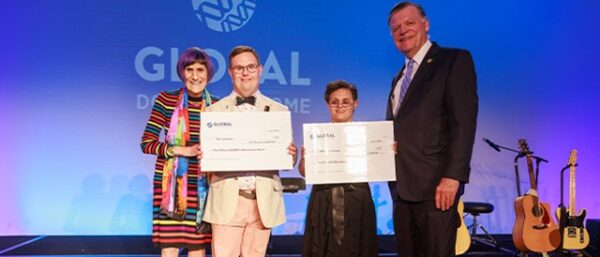
(pictured L-R) Congresswoman Rosa DeLauro, Awardee Eric Latcheran, Awardee Melissa Silverman, Congressman Tom Cole
In a heartwarming celebration of talent, perseverance, and advocacy, the Global Down Syndrome Foundation (GLOBAL) recognized the remarkable accomplishments of two extraordinary individuals with Down syndrome at the 2023 AcceptAbility Gala in Washington, DC. Eric Latcheran and Melissa Silverman were honored with the inaugural Rosa DeLauro and Tom Cole GLOBAL Advancement Awards to support their continuing education.
At the AcceptAbility Gala, GLOBAL recognized the transformative leadership of Representatives Rosa DeLauro and Tom Cole by unveiling post-secondary awards in their names. This gesture highlights their unwavering dedication to advancing the rights and opportunities for individuals with Down syndrome. The Rosa DeLauro and Tom Cole GLOBAL Advancement Awards will continue to inspire and support future generations in their pursuit of furthering their education and personal growth.
Eric Latcheran: Inaugural Rosa DeLauro GLOBAL Advancement Award Recipient
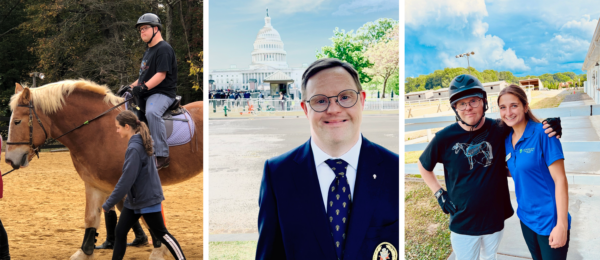
Eric, a shining example of resilience and determination, was bestowed with the inaugural Rosa DeLauro GLOBAL Advancement Award. This accolade serves as a testament to his exceptional achievements and serves to motivate others in their pursuit of personal growth. Eric’s tenacity knows no bounds, and he has consistently defied expectations.
With his award, Eric has chosen to pursue therapeutic horseback riding, a venture that aligns with his passion for animals and holistic well-being. Equine therapy has been known to improve physical strength, balance, and emotional well-being in individuals with Down syndrome, making it an ideal choice for Eric to further enhance his personal development.
Melissa Silverman: Inaugural Tom Cole GLOBAL Advancement Award Recipient
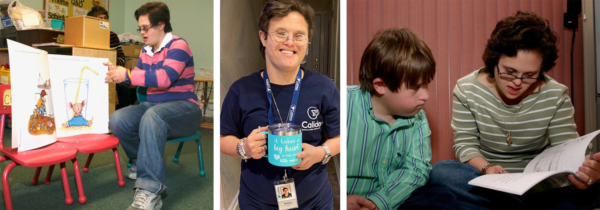
Melissa, a beacon of inspiration and fortitude, has been honored as the recipient of the inaugural Tom Cole GLOBAL Advancement Award. Her unwavering commitment to personal growth and the betterment of her community has earned her this prestigious recognition.
Melissa will utilize her award to maintain her 90-hour childcare certification. With a profound love for nurturing and supporting children, she understands the significance of quality care and aims to provide the best environment for their growth and development. Melissa’s dedication to her certification exemplifies her commitment to lifelong learning and her unyielding pursuit of excellence.
Eric and Melissa, two remarkable individuals with Down syndrome, have been rightfully honored by GLOBAL with the inaugural Rosa DeLauro and Tom Cole Advancement Awards for their exceptional achievements. These awards serve as a reminder of the limitless potential that lies within every person, regardless of their abilities. Eric’s choice of therapeutic horseback riding and Melissa’s commitment to maintaining her childcare certification reflect their dedication to personal growth and making a positive impact on their communities. Let us celebrate their accomplishments and be inspired by their unwavering determination to overcome barriers and continue to thrive.
See more highlights of the 2023 AcceptAbility Gala here!
Fifteen Years of Hard Work Recognized with Exceptional Meritorious Service Award and Standing Ovation at the NDSC Annual Convention in Orlando Florida
July 25th, 2023 by Cole Wilkes
Global Down Syndrome Foundation President & CEO Michelle Sie Whitten Brings Large Team on Stage, Describes Their Work as a ‘Team Sport’
DENVER – July 25, 2023—Global Down Syndrome Foundation (GLOBAL) co-founder, president & CEO, Michelle Sie Whitten, received the Exceptional Meritorious Service Award from the National Down Syndrome Congress (NDSC) at their annual convention in Orlando, Florida this past weekend. Michelle received the award, the highest NDSC honor, for establishing the first Down syndrome research and medical care institute in the U.S. fifteen years ago and for the transformative results her organization has created for children and adults with Down syndrome.
GLOBAL is the leading government advocacy organization for research and medical care specifically for children and adults with Down syndrome. Their work with the Congress, the National Institutes of Health (NIH), scientists and medical professionals and the Down syndrome community has led to the creation of a trans-NIH Down syndrome funding program (INCLUDE) that has provided over $250 million in Down syndrome research funding from 17 different institutes over the last five years alone. Most importantly, the funding has led to game-changing discoveries including four NIH-funded clinical trials (two in Alzheimer’s, one in autoimmune disorders and one in regression) at GLOBAL’s Crnic Institute for Down Syndrome.
NDSC executive director, Jordan Kough, and NDSC chair of the board, Kate Dougherty presented the award to Michelle who received a standing ovation. Michelle brought her team at the convention up on stage and explained that their work is a ‘team sport.’ She thanked the advocates that came before them, the amazing people with Down syndrome GLOBAL serves, Congressional and NIH champions, GLOBAL members and supporters, and the incredible staff at GLOBAL and GLOBAL’s affiliates – Dr. Joaquín Espinosa and the Crnic Institute, the Sie Center for Down Syndrome at Children’s Hospital Colorado, the Adult Medical Center at Denver Health, and the Alzheimer’s and Cognition Center all on the Anschutz Medical Campus.
“We are so thrilled to honor Michelle Sie Whitten as our 2023 Exceptional Meritorious Service Award recipient. We are fortunate that her daughter, Sophia, inspired Michelle to create GLOBAL and to dedicate her life to elongating lifespan and improving health outcomes for children and adults with Down syndrome,” said Jordan Kough. “Michelle and GLOBAL fill a much-needed void in medical research and care. We have supported her tireless fight in Washington DC to increase the NIH Down syndrome annual research funding from $16 million in 2004 to $130 million in 2023. The results of that advocacy can be positively felt in our medical community throughout the U.S. and even across the world.”
Each year since 1977, NDSC has presented this award at their annual convention to community leaders who significantly improve the lives of people with Down syndrome and their families. Their convention, the largest Down syndrome conference in the world, attracts well over 3,000 registrants and is in a different city each year. Past Exceptional Meritorious Service Award recipients include Siegfried Pueschel, Jerome LeJeune, Emily Perl Kingsley, Eunice Scriver, Allen Crocker, Sally R. Shott, Anna & John J. Sie, Joan Guthrie Medlen, Maria Dellapina, Dr. Jesus Florez, Dr. Libby Kumin, Dr. Dennis McGuire, Terri Couwenhoven, and Nancy Gianni.
At the award ceremony, with GLOBAL executives and representatives Frank Stephens, Bryn Gelaro, Dr. Espinosa, David Tolleson, Brad Hennefer, Taylor Murphy and others by her side, Michelle thanked the NDSC, “NDSC welcomed me and my new ideas from the very beginning and through this powerful magnet of a convention they allowed GLOBAL, and so many other Down syndrome organizations, to connect, learn and grow with our community. They see us, value us, and know that we are future collaborators not competitors and that openness and leadership truly allow 1,000 flowers to bloom.”
Every year GLOBAL hosts the GLOBAL Research & Medical Care Roundtable at the NDSC Annual Convention as a free benefit to convention attendees. This year over 400 people attended to learn about the latest developments and treatments associated with eye and vision care, feeding and swallowing issues, adult care, important research at the NIH and Crnic Institutes and more. In addition to the roundtable, GLOBAL and NDSC publish a free prenatal and newborn pamphlet that has recently been joined by NDSS as a supporter. GLOBAL and NDSC also support each other’s key initiatives such as the GLOBAL Adult Medical Guideline and the NDSC Sibling and Educational toolkits and conferences.
###
About Global Down Syndrome Foundation
The Global Down Syndrome Foundation (GLOBAL) is the largest non-profit in the U.S. working to save lives and dramatically improve health outcomes for people with Down syndrome. GLOBAL has donated more than $32 million to establish the first Down syndrome research institute supporting over 400 scientists and over 2,200 patients with Down syndrome from 33 states and 10 countries. Working closely with Congress and the National Institutes of Health, GLOBAL is the lead advocacy organization in the U.S. for Down syndrome research and care. GLOBAL has a membership of over 100 Down syndrome organizations worldwide, and is part of a network of Affiliates – the Crnic Institute for Down Syndrome, the Sie Center for Down Syndrome, and the University of Colorado Alzheimer’s and Cognition Center – all on the Anschutz Medical Campus.
GLOBAL’s widely circulated medical publications include Global Medical Care Guidelines for Adults with Down Syndrome, Prenatal & Newborn Down Syndrome Information and the award-winning magazine Down Syndrome WorldTM . GLOBAL also organizes the Be Beautiful Be Yourself Fashion Show, the largest Down syndrome fundraiser in the world. Visit globaldownsyndrome.org and follow us on social media (Facebook & Twitter: @GDSFoundation, Instagram: @globaldownsyndrome).
Scientists Discover Mechanism Affecting Heart Development in Down Syndrome
July 18th, 2023 by admin
Research at the University of Colorado Anschutz Medical Campus discovers a molecular mechanism contributing to the development of heart malformations in infants with Down syndrome.
From Down Syndrome World Issue 2, 2023
Newborns with Down syndrome, a genetic condition resulting from an additional copy of chromosome 21 (trisomy 21), face a significantly increased likelihood of being born with congenital heart defects. Roughly half of all babies with Down syndrome are estimated to have some form of heart malformation, making Down syndrome the leading cause of congenital heart abnormalities. Despite numerous research endeavors spanning many years, the specific mechanisms through which trisomy 21 disrupts the normal development of the heart in the embryonic stage have remained elusive.
In a recent breakthrough, researchers at the University of Colorado Anschutz Medical Campus have uncovered a molecular mechanism that plays a role in the impaired development of the heart in individuals with Down syndrome. Led by Dr. Kunhua Song, a Linda Crnic Institute for Down Syndrome collaborator and an associate professor of medicine, the team conducted a series of experiments using both human cells with and without trisomy 21 and a mouse model of Down syndrome. These investigations shed light on the specific molecular factors contributing to the defective formation of the heart in Down syndrome.
By utilizing pluripotent stem cells sourced from participants in the Human Trisome ProjectTM, a comprehensive study spearheaded by the Linda Crnic Institute for Down syndrome at the University of Colorado, the research team took on the task of simulating the early stages of heart development, known as cardiogenesis, within a laboratory setting. During their investigation, they made a noteworthy observation: trisomy 21 hindered the process of cardiogenesis, and this malfunction appeared to be linked to an overactive cellular response to viral infections, specifically the interferon response. The team then proceeded to employ genetic and pharmacological techniques, successfully demonstrating that by blocking the interferon response, they could enhance cardiogenesis in the laboratory setting. This finding suggests a potential therapeutic avenue for improving heart development in individuals with Down syndrome.
“We were surprised to see strong activity of the interferon response during differentiation of pluripotent stem cells into heart muscle cells with trisomy 21. We now appreciate that an abnormally high interferon response could be detrimental to early heart development.”
— Dr. Kunhua Song, Crnic Institute Collaborator and Associate Professor
Dr. Song expressed his surprise at the robust activation of the interferon response during the differentiation of pluripotent stem cells into heart muscle cells with trisomy 21. The research team had not expected such heightened activity, and they now understand that an excessively elevated interferon response may have negative implications for the early stages of heart development. This discovery highlights the potential harmful effects of an abnormal interferon response on the proper formation of the heart in individuals with Down syndrome.
Continuing their inquiry, the researchers delved further into understanding how the hyperactive interferon response hindered cardiogenesis. Through their investigation, they made an additional breakthrough by uncovering that the interferon response actually impedes several crucial molecular processes necessary for proper heart development, including the Wnt signaling pathway. This finding sheds light on the specific mechanisms through which interferon hyperactivity disrupts the intricate series of molecular events essential for the formation of a healthy heart.

Per Dr. Congwu Li, primary author of the study, “Excessive interferon activity results in insufficient Wnt signaling, thereby compromising cardiac muscle cell performance. Unveiling this sequence of occurrences sheds light on possible approaches to mitigate abnormal heart development in Down syndrome by reducing interferon signaling and/or enhancing Wnt signaling.”
To assess the efficacy of this therapeutic approach in a Down syndrome mouse model, the researchers administered a JAK inhibitor—a medication that diminishes the interferon reaction—to pregnant female mice. They then observed the impact on heart development in the embryos possessing a genetic modification analogous to trisomy 21. Remarkably, treating the pregnant mice with the JAK inhibitor exhibited a significant enhancement in cardiogenesis among the mice.
“These findings hold great significance as they propose a prospective pharmacological approach for prenatal intervention in mitigating one of the severe consequences of trisomy 21. Infants born with Down syndrome and congenital heart anomalies encounter numerous hurdles, ranging from early postnatal cardiac surgeries to enduring physiological repercussions throughout their lives. Nevertheless, extensive further investigations are imperative to ascertain the safety and effectiveness of utilizing JAK inhibitors during pregnancy,” elucidates Dr. Joaquin Espinosa, co-author of the paper and executive director of the Linda Crnic Institute for Down syndrome.
Dr. Espinosa and his research team are presently at the forefront of clinical trials investigating the advantages of JAK inhibitors in older individuals, including children and adults, affected by Down syndrome.
These findings contribute to the expanding body of evidence highlighting the detrimental consequences of excessive interferon activity in Down syndrome, even in the initial phases of embryonic development. The outcomes further endorse the notion that several distinctive features of Down syndrome stem from persistent immune system dysregulation throughout life, and that reinstating immune equilibrium could yield therapeutic advantages.
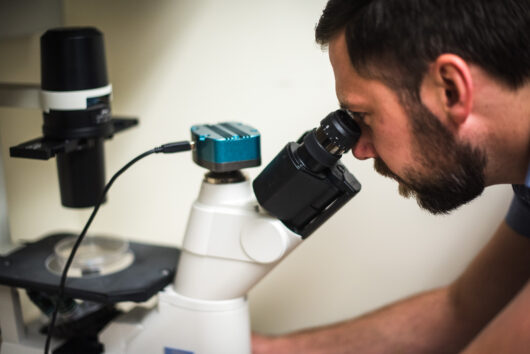
“This collection of research serves as evidence of the remarkable scientific progress that can be achieved with adequate resource allocation and the enthusiastic participation of individuals with Down syndrome in research,”
— Dr. Joaquin Espinosa, Executive Director of the Linda Crnic Institute for Down Syndrome
“We are currently witnessing a genuine renaissance in the realm of Down syndrome research, propelled by substantial support from the National Institutes of Health INCLUDE Project, which represents the culmination of extensive advocacy by the Global Down Syndrome Foundation. Thanks to these concerted efforts, we hold a confident belief that individuals with Down syndrome will enjoy extended and healthier lifespans.”
Alzheimer Disease Pipeline Update: Inside Look at Promising Agents with Dr. Huntington Potter
July 18th, 2023 by Cole Wilkes
CU Anschutz’s Katherine Waugh: Immunity Genes May Play a Role in Down Syndrome
July 6th, 2023 by Cole Wilkes
2023 June GLOBAL Newsletter
June 29th, 2023 by admin
AcceptAbility Gala Highlights, New GLOBAL Fitness Program, Research and Medical Care Roundtables, and more – Your June Newsletter!
Several Down Syndrome Features May Be Linked to a Hyperactive Antiviral Immune Response – New Crnic Institute Research
June 20th, 2023 by Cole Wilkes
Estate Planning for Families Who Have a Loved One with Down Syndrome
June 16th, 2023 by admin
Hal Wright is the author of the must-read book ‘The Complete Guide to Creating A Special Needs Life Plan.’ After 27 years in finance, Hal became a beloved Certified Financial Planner specializing in planning for those with special needs. He is now retired but active on the speaking circuit.
From Down Syndrome World Issue 1, 2023
This is for families who have a loved one with Down syndrome— a child, a brother, a sister, a grandchild or perhaps a friend. I will primarily address the social aspects of estate planning without going into the legal or financial aspects, except that I will briefly address the role of a special needs trust in an estate plan. I also want to emphasize the importance of end-of-life care planning for a person with Down syndrome.
I have a daughter with Down syndrome in her mid-thirties. She has lived in her own apartment for ten years, independently with supports. A “child” in this article doesn’t mean someone under age 18. My daughter will be my child no matter how old she is.
ESTATE PLANNING 101
Estate planning is for anyone who has something valuable to leave to a loved one. By something valuable I mean real estate such as a house, financial assets such as retirement savings, death benefits from a life insurance policy, collectibles such as art, and so forth. Basically, anything that can be titled, valued, sold, or cashed in should be considered a potential element of an estate. Obviously wealthier families who own valuable property, a business or who
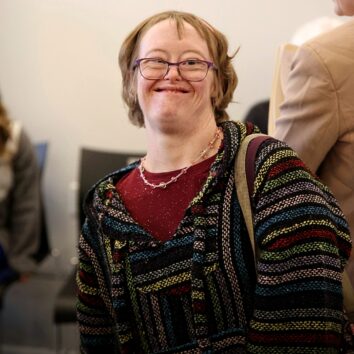
have substantial wealth will have complicated estate plans. However, even a family that has nothing to leave but love should consider how that love will be expressed and passed on. For them, a life plan for their child is a truly valuable legacy.
All parents should have a life plan for a child with special needs that describes the parents’ wishes for the child and the child’s wishes for themselves. The plan includes what is necessary to make it possible, that is, the resources and supports. All financial and legal plans, including estate plans, start with a life plan. A family’s financial plan and the parents’ retirement and estate plans must consider the cost of the child’s lifetime support and how to provide for it. There are five things you do to create a sustainable plan:
1. Develop a life plan and update it periodically for changes in circumstances. Pay special attention to major life transitions like aging out of school or the death of a parent.
2. Establish a circle of support to manage the life plan through all the years of the child’s life. This is especially important should the child outlive her parents.
3. Teach the life skills for community participation and maximum independence.
4. Write a letter of intent (LOI) to document the life plan including the arrangements you have made for care and support after you pass away. The LOI guides the people in the circle of support.
5. Decide on the forms of protection and oversight that the child will require when you’re no longer able to care for him yourself. This could be a court-appointed guardian whom you choose, personal advocates, agents holding powers of attorney and fiduciaries for managing money.
ACCOUNT FOR UNEXPECTED CIRCUMSTANCES
Too often inadequate consideration is given to how a plan evolves as the child ages. There are two important considerations to plan for.
First, parents should consider the possibility that their child could outlive them, especially if one parent dies or both die prematurely. Adequate life insurance is almost always a “must have” to the extent affordable. People with Down syndrome have shorter life spans than the wider population. Currently their life expectancy is around sixty years of age . (A life expectancy means half of the people will die earlier and half will die later than that age.) However, women who are over thirty-five years old have a higher chance of having a baby with Down syndrome than those who are under thirty-five. Thus, it is quite possible that a baby will outlive middle-aged parents if the child remains healthy throughout life. My daughter will likely outlive me, perhaps by fifteen years. She may outlive my spouse, Eleanor, who could well live into her nineties. However, Eleanor will likely experience the diminishments of aging (perhaps dementia) at an earlier age at the same time our daughter is needing greater care.
The second consideration, and the most tragic, is Alzheimer’s disease, the symptoms of which begin to appear in many adults with Down syndrome in their mid-fifties. Over fifty percent of people with Down syndrome will show symptoms by age 55. Therefore, and I cannot stress this enough, planning for the end-of-life care for someone with Down syndrome due to early onset dementia is something you must do. If your child is an adult, you cannot count on a medical miracle that will lift this scourge from our loved ones. While organizations like the Crnic Institute for Down Syndrome and the Global Down Syndrome Foundation are making progress, biologists and medical researchers have searched unsuccessfully for a cure for AIDS for over 40 years. Same with cancer.
It is quite possible that an individual who shows symptoms at age 55 could live for another six or seven years. In that span he may progress from care in an assisted living facility to eventually moving into a cognitive custodial care or skilled nursing facility. The problem is how to pay for the cost. Quality care is very expensive. Most parents plan, or perhaps only hope, they will take care of their child in their old age. This can become seriously unrealistic as they age and experience physical or cognitive decline or a serious disease themselves.
WHAT IS THE COST OF LONG-TERM CARE?
How expensive is the cost of care in a facility? In Denver, Colorado, the average cost of a private room in an assisted living facility in 2023 will likely range from $70,000 to $75,000 per year. (Costs as well as the quality of care vary widely.) Cognitive custodial care for dementia is around $90,000 annually. A private room in a skilled nursing facility is in the range of $130,000 a year. This presents a serious challenge for most families planning for their child’s end-of-life care. How can people pay such huge expenses over a five to seven year period?
Medicare does not cover the cost of long term care in a facility. Medicare is the federal health insurance program for people who are 65 or older, who have amyotrophic lateral sclerosis or end stage kidney failure, or who have received Social Security Disability benefits for twenty-four consecutive months.
What then, are the options?
Wealthy families will pay for the highest quality care. About ten percent of the American population are affluent enough to do so.
About twenty-five percent of the aging population has long term care insurance (LTCI) to cover the cost. Not surprisingly, it is impossible to get LTCI for a child with a disability.
Medicaid is a joint federal and state program that provides health coverage to people with low income. Medicaid pays about two-thirds of long-term care costs in this country because people either haven’t planned for it, they never had the financial means to buy insurance (it’s expensive), or they haven’t been able to save enough to pay for the care themselves. Anyone who has ever had a loved one, such as a parent, in a Medicaid facility will not want their child to end their lives in one if they can help it because of the problems with quality of care and concerns about abuse and neglect.
The considerations just described are why parents who have a child with special needs should be very serious about estate planning. An essential element of their estate plan will include an adequately funded trust to ensure the child’s (the beneficiary’s) lifetime financial support. Wealthy families will usually create a disability trust. Less affluent families will create a special needs trust which allows parents to leave money for their child’s support without affecting eligibility for means-tested government assistance such as Supplemental Security Income (SSI), Medicaid, and the Home and Community Based Services programs for persons with disabilities (HCBS, also called Medicaid-waiver). The two most common ways for funding a trust are regular contributions to a trust during life and life insurance. Life insurance is the most common way trusts are funded. Many use both. I use both.
Pre-funding end-of-life care for a child with Down syndrome will be, or certainly should be, a significant consideration in funding a trust. The costs of care will likely be in the range of a few to several hundred thousand dollars depending on when and how you fund the trust. This is why adequate life insurance is a must for most families.
Special needs planning includes a wide range of sophisticated and complex issues. Parents can and should do life planning themselves with assistance in areas such as social services and education. Most families will need professional advice for legal and financial planning. It is straight forward to find attorneys to draft legal documents such as personal wills and trusts. These attorneys practice in the domains of Elder Law and Trusts and Estates Law. It is harder to find financial planners who are knowledgeable, experienced, and ethical. I strongly recommend Certified Financial Planners or CFPs. I encourage you to work with a financial planner before you go to a life insurance agent. You should know what you need, not what someone wants to sell you.
WHERE DO YOU GO FROM HERE?
I have hit a few major considerations in special needs planning, but this article only scratches the surface. When I give presentations to parents and families, I leave them with: “Where do you go from here?” So I leave you with this. I have written a book on the subject: The Complete Guide to Creating a Special Needs Life Plan. Published in 2013, it explains how to create a comprehensive plan integrating the life, resource, financial and legal plans into a practical plan of action. When it was published, the Library Journal, the journal for professional librarians, gave it a red star review (meaning recommended for library acquisition) with the verdict: “Essential.” It still sells on Amazon. It is 360 pages in length with four, twenty-five-page case studies to show readers what a realistic plan looks like.
Although ten years old, it remains relevant today. If I were to update for a second edition, I would add a chapter titled: “A Home of Her Own: Supported Independence.” I passionately believe that supported independence for most adults with Down syndrome is a realistic goal with adequate planning, resources (including financial), and a good life plan.
I’ll close with a thought for those who are financially well-off enough to leave a substantial legacy. Most people think first about those they love – their spouse, their children, their grandchildren or a loved one like a brother or sister. However, some may want to consider a legacy to a charity or institution that has made a meaningful contribution to your child with Down syndrome’s well-being.
My daughter is in a race against time, a race between the clock as she ages and the medical professionals searching for a way to block the amyloid-β protein path, the significant contributor to the development of Alzheimer’s Disease.
I put this forth for my daughter’s sake and perhaps yours. Please consider in your estate planning, if you have the means to do so, a contribution to fund the research to stop this vicious disease and lift this scourge from our children.

 Experience our inspirational and groundbreaking videos and photos. Our children and self-advocates are beautiful AND brilliant!
Experience our inspirational and groundbreaking videos and photos. Our children and self-advocates are beautiful AND brilliant! Make sure your local Representatives are on the Congressional Down Syndrome Task Force.
Make sure your local Representatives are on the Congressional Down Syndrome Task Force.